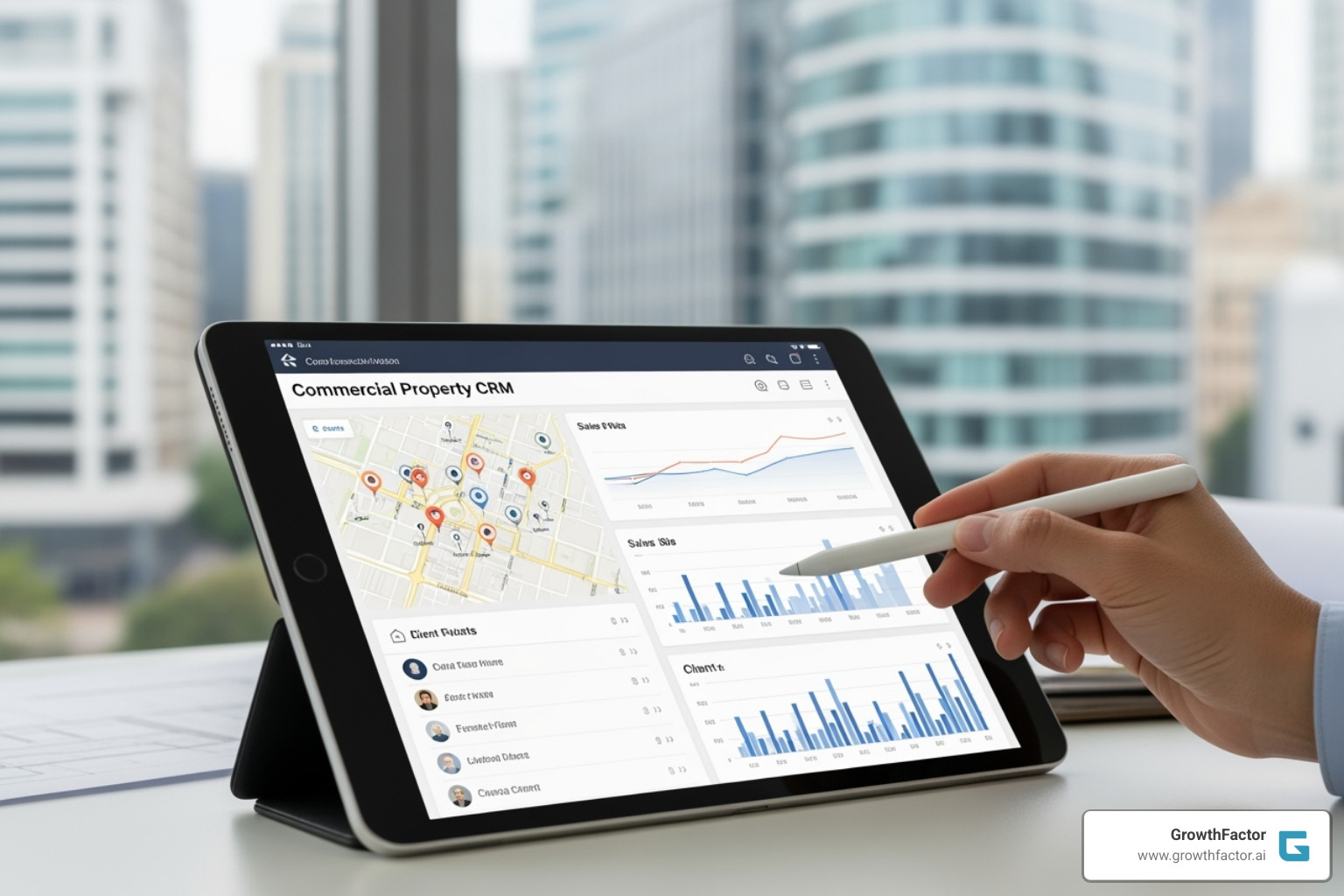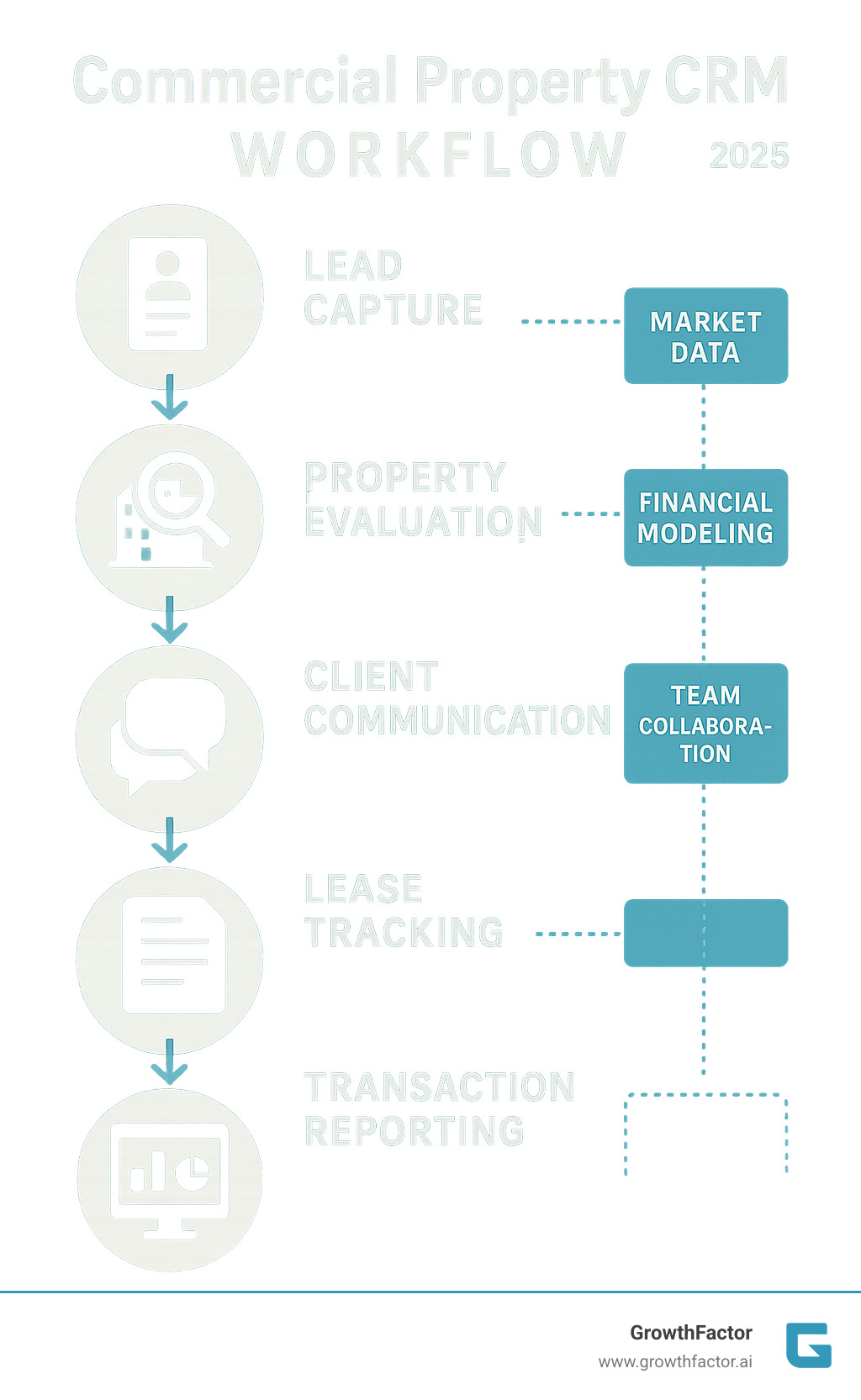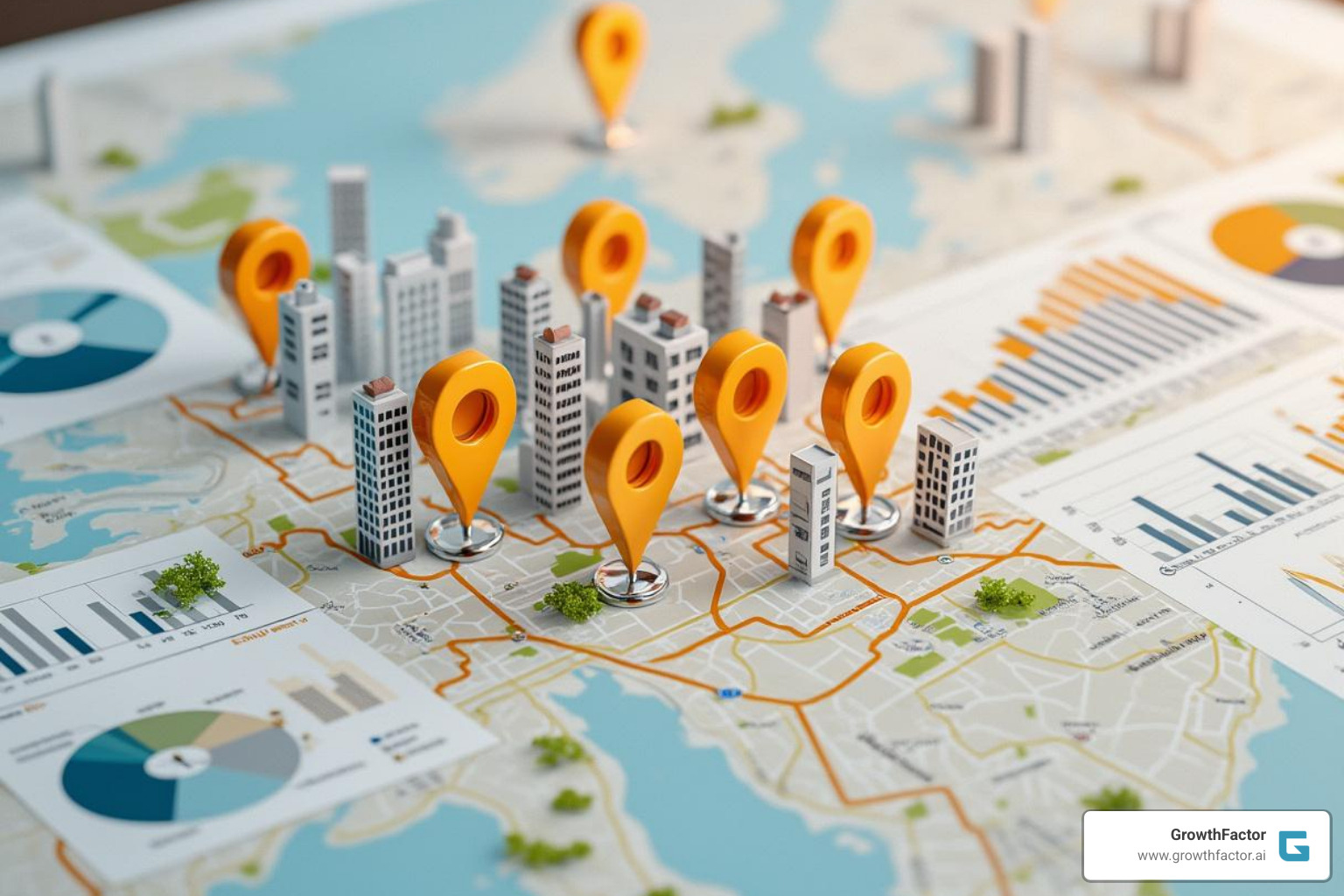The Ultimate Toolkit for Commercial Real Estate Professionals
Written by: Clyde Christian Anderson
Why Modern Commercial Real Estate Demands a Smarter Approach

Commercial property CRM software is the backbone for successful real estate professionals managing complex deals, tracking properties, and nurturing client relationships. The market offers a range of solutions, from general CRMs adapted for real estate to highly specialized, industry-specific platforms.
The commercial real estate world has evolved far beyond sticky notes and spreadsheets. As one industry veteran put it: "Real Estate business is a contact sport, if you forget them, they'll forget you." Today's professionals need systems that can handle million-dollar deals, track lease expirations, and maintain relationships that span decades. A commercial property CRM acts as a central command center for property details, client histories, deal pipelines, and market intelligence.
Unlike general CRMs, these systems understand the unique complexity of the industry. They track square footage, cap rates, and lease terms alongside contact information. They can automate commission calculations, generate marketing materials, and integrate with key industry databases.
I'm Clyde Christian Anderson, CEO of GrowthFactor.ai. We've helped retailers like Cavender's and Books-A-Million streamline their real estate operations. I've seen how the right commercial property CRM can transform a team's ability to identify, evaluate, and close deals faster than ever before.

What is a Commercial Real Estate (CRE) CRM and Why Is It Different?
Let's start with the basics. CRM stands for Customer Relationship Management, but a commercial property CRM is much more than a digital address book. Think of it as your strategic command center, where every client conversation, property detail, and deal milestone lives in harmony. It tracks every interaction, creating a comprehensive story of each relationship over time.
Imagine meeting an investor after six months. Instead of searching through emails, you pull up their profile and instantly see their investment preferences, past deals, and portfolio goals. That's the power of a well-implemented commercial property CRM.
From Generalist to Specialist: The CRE CRM Advantage
You could use a general business CRM, but it's like performing surgery with a butter knife. General CRMs don't understand cap rates, lease expiration dates, or complex commission splits. A specialized commercial property CRM speaks our language from day one. These systems come loaded with what we need:
- Property databases that track ownership history and zoning details.
- Lease management modules for handling renewals and expirations.
- Commission calculation tools that handle complex multi-party deals.
- Industry-standard integrations that connect with mapping software, financial modeling tools, and property listing platforms.
The Data at Your Fingertips

Here's where a commercial property CRM really shows its value: everything you need lives in one place. Client histories, property details, lease expiration dates, and deal stages all exist on a single dashboard. This data centralization breaks down information silos. Whether you're in the office or on-site, everyone has access to the same current information. Mobile access is a game-changer, allowing you to update deal stages, log conversations, and check property details from anywhere.
The Indispensable Role of a CRM in Boosting CRE Success
In today's CRE landscape, operating without a commercial property CRM is a significant handicap. Teams using modern CRM systems consistently save 10+ hours per week on administrative tasks alone. That's time reinvested in what drives revenue: building relationships and closing deals.
A well-implemented CRM transforms operations by enabling data-driven decisions, maintaining team accountability, and ensuring no valuable relationship slips through the cracks.
Streamline Your Deal Management and Pipeline
Commercial real estate deals are complex. Without proper tracking, opportunities can die in the pipeline. A visual deal pipeline changes everything, showing the entire flow from initial contact to closing. Task automation handles repetitive work like scheduling follow-ups and sending email campaigns. Automated reminders ensure nothing is forgotten, while document management centralizes all critical files.
The result is reduced manual data entry. As one industry expert put it, "You didn't become a broker to spend all your time huddled behind a computer creating pitch materials." A good CRM gets us back to being dealmakers, accelerating sales cycles and closing deals faster.
Cultivate Stronger, More Profitable Client Relationships
In commercial real estate, your network is your net worth. A commercial property CRM is invaluable for relationship building, providing a 360-degree client view. When a client calls, you can instantly access their complete history, including previous transactions and property preferences. This enables personalized communication that builds trust.
Automated marketing campaigns keep you top-of-mind by sending targeted market updates or lease renewal reminders. This relationship nurturing on autopilot leads to stronger partnerships, increased repeat business, and more referrals, creating a sustainable competitive advantage.
Core Features of a High-Performance Commercial Property CRM
When shopping for a commercial property CRM, it's crucial to find a tool that improves how you work. A high-performance CRM should be intuitive yet powerful enough to grow with your business.

Foundational Contact and Property Management
- Contact Database: Captures the full story of each relationship, including communication preferences and deal history.
- Property Database: Tracks ownership history, zoning details, loan information, and tenant rosters.
- Comps Data: Allows you to pull up detailed comparable property data in seconds.
- Advanced Search: Instantly find properties or contacts using specific, complex criteria.
- Mapping Integration: Visually plots properties on a map with market and demographic data.
Advanced Deal and Pipeline Tracking
- Customizable Deal Stages: Lets you map out your unique sales process.
- Pipeline Visualization: Provides a bird's-eye view of your business to see which deals are moving and which are stalled.
- Commission Tracking: Automates calculations for deals with multiple agents and complex fee structures.
- Activity Logging: Creates an automatic trail of every interaction, from calls to property tours.
- Document Generation: Creates professional marketing materials like offering memorandums directly from CRM data.
The Power of AI and Automation in a commercial property CRM
AI in a commercial property CRM is about working smarter, not harder.

- AI-Powered Lead Scoring: Analyzes engagement patterns to identify which leads are most likely to convert.
- Predictive Analytics: Spots market trends and identifies opportunities before the competition.
- Automated Data Enrichment: Keeps your database fresh by automatically updating contact and property data.
- AI-Powered Lease Abstraction: Extracts key terms and dates from lengthy lease documents, reducing errors and saving time.
At GrowthFactor, our AI Agent Waldo demonstrates this by enabling retail real estate teams to evaluate five times more sites, feeding qualified opportunities directly into the deal pipeline.
Reporting, Analytics, and Integrations
- Customizable Dashboards: Put your most important metrics (KPIs) front and center.
- Team Performance Reporting: Tracks productivity to identify training opportunities and recognize top performers.
- Portfolio Analysis: Provides insights into property performance to inform investment strategies.
- Integration Capabilities: Your CRM must connect with other tools, including email, calendars, marketing automation, and accounting software.
How to Choose the Best Commercial Property CRM for Your Business
Selecting the right commercial property CRM is a critical technology decision. It's not about finding the fanciest software, but the solution that understands how you work and supports your growth. Think of it as choosing a business partner who speaks your language and helps you succeed.
Key Factors to Evaluate
When evaluating a commercial property CRM, consider both your immediate needs and future growth plans.
| Factor | Considerations |
|---|---|
| Cost | Consider the total cost of ownership, including setup, training, and support, not just the monthly fee. |
| Scalability | Can the system grow with your team from a solo agent to an enterprise brokerage? |
| Ease of Use | An intuitive interface is critical. If the team struggles to adopt the system, it's worthless. |
| Mobile Access | Robust mobile apps that work offline are essential for professionals on the move. |
| Integration | The CRM should connect seamlessly with your email, calendar, and other essential tools. |
| Customer Support | Responsive, knowledgeable support is crucial when deals are on the line. |
| Data Security | Look for robust encryption and compliance with data protection regulations. |
User adoption often determines success or failure. Involve your team in the selection process to ensure they are invested in the outcome. During demos, note how many clicks it takes to complete common tasks. Mobile functionality isn't optional; you need full CRM access from anywhere.
Overcoming Implementation Challenges
Even the best commercial property CRM can fail with poor implementation. The biggest hurdle is getting your team to use the new system consistently.
- Training and Change Management: Plan for multiple training sessions and provide varied resources like videos and hands-on practice. Involve your team in the selection process to increase buy-in.
- Data Migration: Clean your existing data before importing it. Remove duplicates and standardize formats. A clean start prevents frustration and builds confidence in the new platform.
- Team-wide Compliance: Ensure everyone understands not just how to use the system, but why it matters. Connect CRM usage to concrete benefits like faster closings or better client service.
Successful implementations are often gradual. Start with core features like contact and deal management, then introduce advanced functions over time. This approach prevents overwhelm and builds confidence.
Why Modern Commercial Real Estate Demands a Smatter Approach
Commercial property CRM software has become the backbone of successful real estate professionals who need to manage complex deals, track multiple properties, and nurture long-term client relationships. The market offers a range of solutions, from general CRMs adapted for real estate to highly specialized, industry-specific platforms.
The commercial real estate world has evolved far beyond sticky-note prospecting and endless spreadsheets. As one industry veteran put it: "Real Estate business is a contact sport, if you forget them, they'll forget you."
Today's successful CRE professionals need systems that can handle million-dollar deals, track lease expirations across hundreds of properties, and maintain relationships that span decades. A commercial property CRM serves as your central command center - storing property details, client histories, deal pipelines, and market intelligence in one accessible platform.
Unlike general business CRMs, commercial real estate systems understand the unique complexity of your industry. They track square footage, cap rates, lease terms, and zoning details alongside traditional contact information. They automate commission calculations, generate property marketing materials, and integrate with industry-specific databases like MLS and CoStar.
I'm Clyde Christian Anderson, CEO of GrowthFactor.ai, where we've helped retailers like Cavender's and Books-A-Million streamline their real estate operations and open up millions in revenue through smarter site selection and deal management. Having worked in retail real estate since the early 2000s, I've seen how the right commercial property CRM can transform a lean team's ability to identify, evaluate, and close deals faster than ever before.
What is a Commercial Real Estate (CRE) CRM and Why Is It Different?
At its heart, CRM stands for Customer Relationship Management. While that might sound like a fancy digital rolodex, a commercial property CRM is far more. It's a strategic tool designed to help us manage every interaction with prospects, clients, and tenants. It centralizes data, tracks communications, and provides a comprehensive history of every relationship. Imagine having all the information you need about a client in one easily accessible place. That’s the power of a well-implemented CRM.
From Generalist to Specialist: The CRE CRM Advantage
You might wonder if you can use a general CRM. The answer is, you could, but it would be highly inefficient. General CRMs lack the specific fields and functionalities crucial for commercial real estate. They don't inherently understand property types, square footage, or complex lease structures.
This is where a specialized commercial property CRM shines. These systems are purpose-built for our world. They come with:
- Built-in Property Databases: To track every detail of a property, from ownership history to zoning information.
- Lease Management Modules: Essential for managing lease expirations and renewals.
- Commission Calculation Tools: To automate complex commission calculations.
- Industry-Standard Integrations: To connect with essential CRE tools like mapping and financial modeling applications.
These custom solutions mean less customization headache and a system that speaks our language from day one.
The Data at Your Fingertips
A core advantage of a commercial property CRM is its ability to centralize all critical data. No more scattered spreadsheets or sticky notes. We can access client history, property details, and deal stages from a single dashboard. This data centralization breaks down silos within our team, ensuring everyone has access to the most current information. Many modern CRMs offer robust mobile access, a critical feature for busy real estate professionals.
The Indispensable Role of a CRM in Boosting CRE Success
If you're still running your commercial real estate business with sticky notes, you're fighting an uphill battle. The modern commercial property CRM isn't just another tech toy; it's the difference between scrambling to keep up and confidently staying ahead.
Every missed follow-up is a potential lost deal. A well-implemented commercial property CRM transforms this chaos into a well-oiled machine. Your team can focus on what they do best – building relationships and closing deals – instead of playing detective with scattered information.
Streamline Your Deal Management and Pipeline
Commercial real estate deals are complex. A robust commercial property CRM is your safety net. Picture a visual deal pipeline that shows exactly where every opportunity stands. Task automation handles repetitive work like scheduling follow-ups, saving at least 10 hours a week for revenue-generating activities. Automated reminders keep deals moving, and document management keeps every file organized and searchable.
As one professional noted, a good CRM helps you "get back the hours you spend in spreadsheets." Those recovered hours go straight into activities that close deals.
Cultivate Stronger, More Profitable Client Relationships
Your network is your net worth. A commercial property CRM provides a 360-degree client view, with every conversation and preference recorded. This personalized communication builds trust and sets you apart. Automated marketing campaigns can nurture leads with relevant updates while you focus on active deals. This reliability translates directly into increased referrals and repeat business – the lifeblood of any successful CRE practice. You're not just managing transactions; you're building lasting partnerships.
Core Features of a High-Performance Commercial Property CRM
Not all CRMs are created equal. To ensure we choose a tool that fits our workflow, we need to look for specific, essential features. A well-chosen commercial property CRM should be scalable, intuitive, and integrate seamlessly with our existing processes.
Foundational Contact and Property Management
- Contact Database: Stores detailed profiles, including preferences and communication history.
- Property Database: Tracks every detail of a property: type, size, zoning, ownership, and tenants.
- Comps Database: A dedicated module for managing comparable sales and leases for market analysis.
- Advanced Search & Filtering: Quickly find contacts or properties based on complex criteria.
- Mapping Capabilities: Visualizes properties on a map to understand geographical context.
Advanced Deal and Pipeline Tracking
- Customizable Deal Stages: Define and track the unique progression of CRE transactions.
- Pipeline Visualization: Provides a clear, at-a-glance overview of all active deals.
- Commission Tracking: Automates the calculation and management of commissions.
- Activity Logging: Automatically tracks every interaction related to a deal or contact.
- Document Generation: Automatically create professional marketing materials from CRM data.
The Power of AI and Automation in a commercial property CRM
Artificial Intelligence is a transformative force in commercial property CRM, taking efficiency to a new level.
- AI-Powered Lead Scoring: Evaluates the potential of leads to help focus efforts on promising opportunities.
- Predictive Analytics: Analyzes market trends and historical data to identify likely buyers or tenants.
- Automated Data Enrichment: Populates contact and company records with third-party data, saving hours of manual entry.
- AI-Powered Lease Abstraction: Extracts key data points from complex lease documents, saving time and reducing errors.
At GrowthFactor, our AI Agent Waldo is a game-changer, enabling retail real estate teams to evaluate five times more sites efficiently, feeding the CRM with qualified leads.
Reporting, Analytics, and Integrations
- Customizable Dashboards: Visualize key performance indicators (KPIs) relevant to your goals.
- Team Performance Reports: Track individual and team productivity.
- Portfolio Analysis: Gain insights into property portfolio performance to inform strategy.
- Integration Capabilities: A CRM must integrate with tools like email, calendars, marketing automation, and accounting software.
How to Choose the Best Commercial Property CRM for Your Business
Choosing the right commercial property CRM requires careful consideration. The key is finding a solution that fits your team not just for today, but for where your business is headed. Think of it as investing in your team's future success.
Key Factors to Evaluate
When you're shopping for a commercial property CRM, several critical factors deserve your attention.
| Factor | Considerations |
|---|---|
| Cost | Look beyond the monthly price. What's the total cost including setup, training, and customization? |
| Scalability | Will the system support your team as it grows? |
| Ease of Use | The best CRM feels intuitive. A complex interface hinders adoption. |
| Mobile Access | Real estate happens everywhere. Mobile functionality isn't optional. |
| Integration | Your CRM should play nice with your existing tools to avoid data silos. |
| Customer Support | Look for responsive, knowledgeable support that understands real estate. |
| Data Security | With high-value deals on the line, security is non-negotiable. |
Budget considerations go deeper than monthly fees. A slightly pricier system that saves 10 hours per week quickly pays for itself. Scalability matters; choose a system that won't require another migration in two years. The user experience can make or break adoption, so prioritize simplicity.
Overcoming Implementation Challenges
Even the perfect commercial property CRM can fail if you botch the rollout. People naturally resist change.
- Training makes all the difference. Proper training transforms skeptics into advocates.
- Change management starts with explaining the "why." Show your team how the new system makes their lives easier.
- Data migration is an opportunity to clean house. Ditch duplicate contacts and outdated records.
- Team-wide compliance is crucial. A CRM is only as good as the data inside it.
- Leveraging training resources from your provider is key. Designate a few CRM champions on your team to help others.
The secret is to start small. Roll out core features first, let people get comfortable, then gradually introduce advanced functionality.
Frequently Asked Questions about CRE CRMs
Choosing a commercial property CRM can be overwhelming. Here are straight answers to the most common questions we hear.
How long does it take to implement a CRE CRM?
It depends. For a small team with clean data, you could be running in a few weeks. For larger organizations with scattered data and complex needs, implementation could take several months. The key is proper planning: clean your data first, know your goals, and start with the basics before customizing everything.
Can a CRM help with both leasing and investment sales?
Absolutely. A well-designed commercial property CRM is versatile. For leasing teams, it's a tenant relationship hub, tracking lease expirations and space requirements. For investment sales brokers, it manages complex buyer lists, tracks deal flow, and helps generate polished offering memorandums. The beauty is that everything connects, allowing you to see the bigger picture and identify cross-selling opportunities.
Is a real estate-specific CRM always better than a general one?
Usually, yes. A commercial property CRM speaks your language from day one, with built-in understanding of cap rates, lease terms, and property types. General CRMs require heavy, expensive customization to handle our unique workflows. While a general platform might work for a company with a strong technical team and very specific needs, for most CRE professionals, the purpose-built tool is the smarter choice.
At GrowthFactor, we've seen how the right technology transforms teams. Our AI Agent Waldo helps retail real estate teams evaluate sites more efficiently because it was built specifically for that challenge. The same principle applies to CRMs.
Conclusion: Future-Proofing Your CRE Business with the Right Tech
The modern commercial real estate landscape is fast and competitive. Technology is no longer optional; it's essential. A commercial property CRM is the foundation of any future-ready CRE business, unifying operations, strengthening relationships, and driving growth.
The right CRM transforms your daily work from spreadsheet chaos into a smooth, efficient operation. You become a dealmaker, not a data entry clerk.
The future of CRE is AI-driven solutions. This means smarter prospecting, automated analysis, and predictive insights that keep you ahead of market changes.
At GrowthFactor, we see this evolution firsthand. Our AI Agent Waldo helps retail real estate teams evaluate five times more sites efficiently. When you pair an intelligent tool like this with a robust commercial property CRM, you get high-quality leads flowing directly into your pipeline, enabling faster, smarter decisions.
Investing in a powerful commercial property CRM isn't just buying software; it's an investment in your future success. The professionals who thrive in the coming years will be those who accept these next-generation tools. They'll spend less time on administrative tasks and more time on what truly matters: building relationships and closing deals.
Citations
The human algorithm
Request Your demo
Schedule meeting
Or submit your information below and we'll be in touch to schedule.


